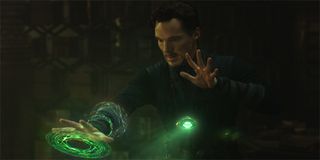Will Future Doctor Strange Movies Still Pull From '60s Marvel Comics? Here's What Scott Derrickson Thinks

As director Scott Derrickson regularly pointed out prior to the film's release, Doctor Strange had a very specific influence in the road to its creation. While Marvel has been publishing Doctor Strange comics for decades, it was the initial issues by Stan Lee and Steve Ditko that primarily inspired both the look and the narrative when it came to the blockbuster. Looking to the future, you might think that this approach could change with new stories -- having sequels find ideas from other eras -- but if it's up to Derrickson, this won't be the case. He believes not only that the greatest material was the work done in the 1960s, but also that the best later examples of Strange stories in Marvel Comics were successful because of how they also themselves expanded on early ideas.
I recently had the pleasure of chatting with Scott Derrickson about Doctor Strange's future on the big screen, and within that arena one subject I touched upon was the material that motivated his first Marvel Studios movie. Noting that the Stan Lee/Steve Ditko comics were so well represented in Doctor Strange, I asked him if he might look to other eras should he get the call to come back and helm Doctor Strange 2. Within his explanation, he noted what drew him to the 1960s stories in the first place, and why he feels that there is still a lot more to explore:
I think even more than any future iterations of the comic, that those early '60s comics and late '60s comics were the ones that were the most visually ambitious and the most ideologically ambitious when it comes to the other dimensions. You know, they just explored such odd places. There's hit and miss comics all through the decades that followed for me, and I really did my homework! I read through the Doctor Strange lexicon, which is, I don't know, it was an obscene number of comics. But most of them are either spinning off into tangents that are just too weird and too unrelated to the character, or they're drawing back into those '60s comics and building upon them in really creative ways. I think that's the way Doctor Strange will probably remain. That's my guess.
It's not as though the first Doctor Strange movie completely exhausted the 1960s comics either. In fact, when you go back and read the earliest stories, you realize that the film pretty much only adapts material from a total of three or four issues (and they were actually only half issues because the Sorcerer Supreme split the "Strange Tales" magazine with solo adventures of the Fantastic Four's Human Torch). Not only are there thousands more stunning Steve Ditko drawings that can inspire the visual effects artists and production designers, but also a tremendous number of great Stan Lee-created characters and stories that are just waiting to be brought to the big screen.
Of course, it should be noted that the future of Doctor Strange as a series is unclear at the moment. Because Marvel Studios is focused on their Phase 3 developments right now -- which include eight movies coming out in the next three years -- the company has yet to say anything official about a Doctor Strange 2. That being said, the 2016 film was Marvel's most successful solo character launch since Iron Man in 2008, so there is very little chance that we don't see a sequel as part of what will become known as Phase 4.
For those hungry for more Doctor Strange, the good news is that the film is currently available on digital platforms, and will be arriving on Blu-ray and DVD next Tuesday, February 28th. Stay tuned for more details on that front, and hit the comments section below to tell us if you think Scott Derrickson is right about the continued influence of the 1960s comics.
CINEMABLEND NEWSLETTER
Your Daily Blend of Entertainment News

Eric Eisenberg is the Assistant Managing Editor at CinemaBlend. After graduating Boston University and earning a bachelor’s degree in journalism, he took a part-time job as a staff writer for CinemaBlend, and after six months was offered the opportunity to move to Los Angeles and take on a newly created West Coast Editor position. Over a decade later, he's continuing to advance his interests and expertise. In addition to conducting filmmaker interviews and contributing to the news and feature content of the site, Eric also oversees the Movie Reviews section, writes the the weekend box office report (published Sundays), and is the site's resident Stephen King expert. He has two King-related columns.
Most Popular



